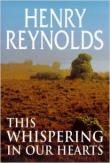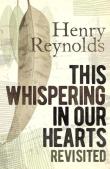AustLit
Latest Issues
AbstractHistoryArchive Description
'Henry Reynolds presents a different history of Australia through the eyes of remarkable and largely forgotten people. This story begins with Australia's first punitive expedition in December 1790 and the first clash of conscience about the use of violence which took place between Governor Arthur Phillip and Lieutenant William Dawes. It ends on the eve of World War II with Harry Bennett still expressing deep anger about the condition of the Aboriginies and the attitudes of whites Australia.' (Source: Goodreads website)
Notes
-
This work contains chapters:
I. The concerns of gentlemen
II. Missionaries and protectors
III. A reasonable share in the soil : Robinson and Threlkeld in New South Wales, 1824-48
IV. Great displeasure : Lyon and Giustiniani in Western Australia, 1829-38
V. Agitation against assassination : Queensland, 1860-80
VI. The crusade of the Queenslander, 1880-90
VII. John Gribble goes west, 1885-87
VIII. Two unlikely agitators : Angelo and Carley, 1880-90
IX. Modern massacre : Forrest River and Coniston, 1926-28
X. The Caledon Bay affair, 1832-34
XI. Agitation and reform, 1920-40
XII. Conclusion.
Publication Details of Only Known VersionEarliest 2 Known Versions of
Other Formats
- Also sound recording and electronic resource.
Works about this Work
-
Book Notes
2020
single work
review
— Appears in: Journal of Australian Studies , vol. 44 no. 3 2020; (p. 401-403)
— Review of This Whispering in Our Hearts 1998 single work non-fiction -
Henry Reynolds : This Whispering in Our Hearts Revisited
2018
single work
essay
— Appears in: The Newtown Review of Books , October 2018;'In this book Henry Reynolds shows that today’s white activists for justice for Indigenous people are inheritors of a long tradition.' (Introduction)
-
Henry Reynolds : Australia Was Founded on a Hypocrisy That Haunts Us to This Day
2018
single work
column
— Appears in: The Conversation , 27 August 2018;'US slave owners wrote and spoke about liberty, equality and the pursuit of happiness. Similar hypocrisy, buried in the foundations of settler Australia, has escaped comparable scrutiny.' (Introduction)
-
Aboriginal Affairs : Humanitarian Intervention Then and Now: Dis/Connections and Possibilities
2017
single work
criticism
— Appears in: Australian Journal of Politics and History , vol. 63 no. 4 2017; (p. 524-539)'Aboriginal affairs has always been a sore point in Australia. Ever since the first Governor attempted to put in place the Colonial Office’s instructions to treat the inhabitants with “amity and kindness” the exercise has been fraught. There is a text-book version of the changing policy landscape and rote school lessons on the gradual acquisition of Aboriginal rights and freedoms. These go some way to conveying the contested ground, political conflict and personal anguish on which this history was built. Yet, they give the impression of evolution and progress. At the same time, the history wars magnified the fractiousness without carving a pathway through. In this paper I recover an important part of the history, which often goes unremarked. I reflect on the role of humanitarian intervention in this politics. Not only has it been critical to the policy landscape — for good and ill — but there are also historical connections and lineages between then and now, which deserve attention. Closely aligned to a history of human rights in Australia, recovering this history seems more pertinent than ever.' (Publication abstract)
-
Furphy as (Metafictive) Aboriginal Ethnographer
2013
single work
criticism
— Appears in: JASAL , vol. 13 no. 1 2013;'This paper investigates Furphy’s ethnographical writings on Aborigines in the short essays and paragraphs he wrote for the Bulletin and in one of his short stories. It also examines his representation of Toby', an 'Aboriginal stockman in Such is Life, and concludes by examining one of the most difficult passages in a colonial era novel, his account of a Palmer River Aboriginal attack, cannibalism, and settler murder in The Buln-buln and the Brolga. These Aboriginal-focused narratives are told as part of a suite of realistic tales by Barefooted Bob and Tom Collins, by way of counter-narrative to Fred Falkland Pritchard’s fantastical romance/action tales which belong to the ripping yarns/Boy’s Own tradition. The paper argues that, although the narrative method, in its refusal to editorialise, is uncharacteristically and unnervingly oblique, there is more than a little of Lilian Pritchard, the Lady Novelist, in Furphy himself and that the questions he puts into the mouth of the Lady Journalist about Aboriginal culture are probing and pungent.' (Author's abstract)
-
About Eight 'Good Hearts"
1998
single work
review
— Appears in: Koori Mail , 3 June no. 177 1998; (p. 26)
— Review of This Whispering in Our Hearts 1998 single work non-fiction 'With issues such as the Wik debate, the stolen generations and concepts of reconciliatuion at the forefrom of national debate, this book comes as a timely publication...' -
Book Notes
2020
single work
review
— Appears in: Journal of Australian Studies , vol. 44 no. 3 2020; (p. 401-403)
— Review of This Whispering in Our Hearts 1998 single work non-fiction -
This Whispering in My Heart
2008
single work
essay
— Appears in: Landscapes of Exile: Once Perilous, Now Safe 2008; (p. 211-220) -
Furphy as (Metafictive) Aboriginal Ethnographer
2013
single work
criticism
— Appears in: JASAL , vol. 13 no. 1 2013;'This paper investigates Furphy’s ethnographical writings on Aborigines in the short essays and paragraphs he wrote for the Bulletin and in one of his short stories. It also examines his representation of Toby', an 'Aboriginal stockman in Such is Life, and concludes by examining one of the most difficult passages in a colonial era novel, his account of a Palmer River Aboriginal attack, cannibalism, and settler murder in The Buln-buln and the Brolga. These Aboriginal-focused narratives are told as part of a suite of realistic tales by Barefooted Bob and Tom Collins, by way of counter-narrative to Fred Falkland Pritchard’s fantastical romance/action tales which belong to the ripping yarns/Boy’s Own tradition. The paper argues that, although the narrative method, in its refusal to editorialise, is uncharacteristically and unnervingly oblique, there is more than a little of Lilian Pritchard, the Lady Novelist, in Furphy himself and that the questions he puts into the mouth of the Lady Journalist about Aboriginal culture are probing and pungent.' (Author's abstract)
-
Aboriginal Affairs : Humanitarian Intervention Then and Now: Dis/Connections and Possibilities
2017
single work
criticism
— Appears in: Australian Journal of Politics and History , vol. 63 no. 4 2017; (p. 524-539)'Aboriginal affairs has always been a sore point in Australia. Ever since the first Governor attempted to put in place the Colonial Office’s instructions to treat the inhabitants with “amity and kindness” the exercise has been fraught. There is a text-book version of the changing policy landscape and rote school lessons on the gradual acquisition of Aboriginal rights and freedoms. These go some way to conveying the contested ground, political conflict and personal anguish on which this history was built. Yet, they give the impression of evolution and progress. At the same time, the history wars magnified the fractiousness without carving a pathway through. In this paper I recover an important part of the history, which often goes unremarked. I reflect on the role of humanitarian intervention in this politics. Not only has it been critical to the policy landscape — for good and ill — but there are also historical connections and lineages between then and now, which deserve attention. Closely aligned to a history of human rights in Australia, recovering this history seems more pertinent than ever.' (Publication abstract)
-
Henry Reynolds : Australia Was Founded on a Hypocrisy That Haunts Us to This Day
2018
single work
column
— Appears in: The Conversation , 27 August 2018;'US slave owners wrote and spoke about liberty, equality and the pursuit of happiness. Similar hypocrisy, buried in the foundations of settler Australia, has escaped comparable scrutiny.' (Introduction)
-
Henry Reynolds : This Whispering in Our Hearts Revisited
2018
single work
essay
— Appears in: The Newtown Review of Books , October 2018;'In this book Henry Reynolds shows that today’s white activists for justice for Indigenous people are inheritors of a long tradition.' (Introduction)





